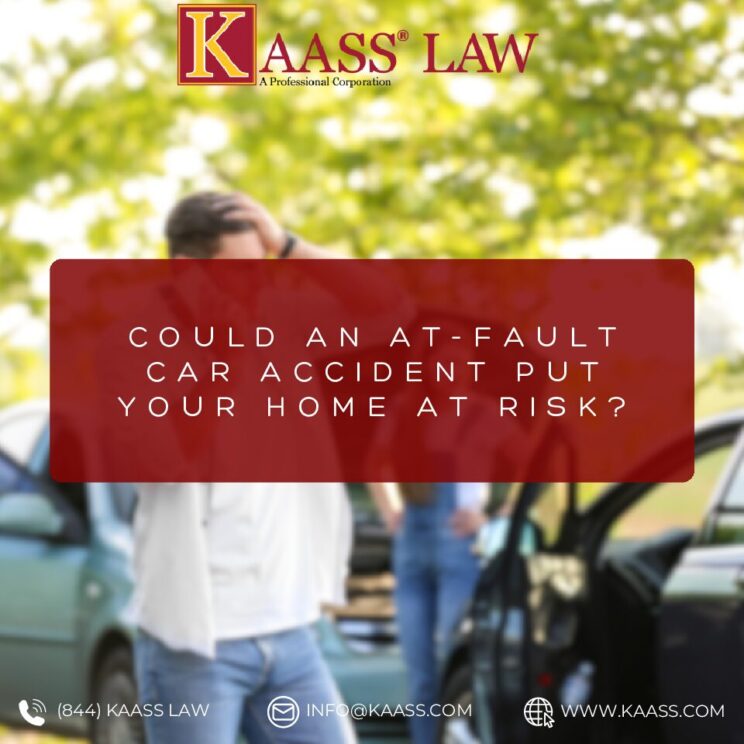The Hidden Risks of Being At Fault in a Car Accident
Car accidents can change lives in an instant. While most people focus on the immediate issues of injuries, medical bills, and car repairs, the financial consequences can go much further. If you are found at fault in a serious accident, the damages may exceed your insurance coverage. When that happens, your personal assets, including your home, could be at risk.
Understanding how liability works, when your home may be at risk, and what protections are available under the law is essential for protecting your financial security. With the right insurance coverage, knowledge of state exemptions, and guidance from experienced attorneys, you can safeguard your most important asset.
Understanding Liability and Insurance Limits
Every car accident begins with determining liability. If you are at fault, your insurance company is required to cover damages up to the limits of your policy. These damages can include:
- Medical expenses for injured parties
- Lost income due to inability to work
- Vehicle repairs or replacement costs
- Pain and suffering claims
Why Minimum Coverage May Not Be Enough
Many states set relatively low minimum insurance requirements. In California, the minimum liability coverage is:
- $15,000 for injury or death to one person
- $30,000 for injury or death to multiple people
- $5,000 for property damage
While these limits might cover minor fender benders, they are quickly overwhelmed in a serious collision. A single hospital stay can easily exceed $100,000. If your insurance coverage runs out, the injured party can pursue you personally for the remainder.
What Happens When Damages Exceed Insurance?
If the total judgment is more than your policy covers, you are responsible for the difference. Creditors can attempt to collect through:
- Wage garnishments
- Bank account levies
- Property liens
- Seizure of certain non-exempt assets
This is the scenario where your home may become a target.
When Your Home Could Be Exposed After an Accident
Your home is typically your most valuable asset, and creditors are aware of this. Whether your house can be taken after an accident depends on several factors, including the laws of your state, the amount of equity you hold, and whether homestead protections apply.
Homestead Exemptions
Most states, including California, provide homestead exemptions that shield a portion of your home’s equity from creditors. In California, homeowners can protect between $300,000 and $600,000 of equity in their primary residence, depending on local property values.
- If your equity falls below the exemption level, your home is generally safe from forced sale.
- If your equity exceeds the exemption, creditors may be able to place a lien on the property.
Judgments and Liens
A judgment in favor of the injured party can result in a lien against your home. A lien does not mean you must immediately vacate or sell your property, but it does mean:
- You cannot sell or refinance the home without paying off the lien.
- The lien can accrue interest, making the debt grow over time.
- Your financial flexibility is restricted until the judgment is satisfied.
Secondary Properties and Renters
It is also important to note that:
- Investment properties and vacation homes generally do not qualify for homestead exemptions, making them more vulnerable.
- Renters cannot lose a home they do not own, but they may still face wage garnishments, bank account seizures, and other collection methods.
How to Protect Your Home and Assets
The good news is that homeowners and drivers are not powerless. With careful planning, you can reduce the risk of losing your home after an accident.
Carry Higher Insurance Limits
Increasing your liability coverage provides a greater safety net. Consider policies of $250,000 or $500,000 per person, rather than the minimum. While premiums may rise, this investment protects your assets in the event of an accident.
Purchase Umbrella Insurance
Umbrella insurance adds an extra layer of liability protection on top of your auto and homeowner’s policies. Most umbrella policies start at $1 million in coverage and are relatively affordable for the protection they offer.
Understand Your State Laws
Because exemption laws vary, knowing how much of your home equity is protected is vital. California homeowners, for example, can review current homestead exemption laws under the California Code of Civil Procedure. Checking these protections helps you evaluate whether you need additional insurance or legal planning.
Act Quickly if Sued
If you are facing a lawsuit after a car accident:
- Contact an attorney immediately to review the case.
- Do not ignore court papers or deadlines.
- Explore settlement negotiations to minimize exposure.
- Ensure your homestead rights are properly claimed and protected.
Early legal action often makes the difference between protecting your assets and facing unnecessary financial hardship.
How KAASS LAW Can Help
An at-fault accident does not automatically mean you will lose your home, but the risks are real if damages exceed your insurance limits. These cases are legally complex, and injured parties often aggressively pursue the collection of judgments.
At KAASS LAW, we help clients protect their homes and assets when liability lawsuits threaten their financial security. Our attorneys can:
- Review your insurance coverage and asset protections
- Defend you in personal injury lawsuits
- Negotiate settlements that reduce your exposure
- Apply exemptions and legal protections to shield your home
Your home is more than a property; it is your family’s foundation. Do not leave it vulnerable. If you have questions about how an at-fault accident could affect your home, or if you are already facing a lawsuit, contact us today. We are ready to fight for your rights and protect what matters most to you. Call KAASS LAW, leave it to us!

